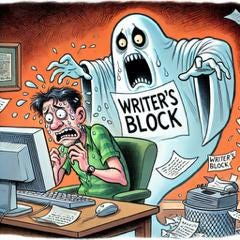What Writer's Block Is and What It Isn't — Part 2
Why is the debate about it so heated? What's really at stake?
Elizabeth: Last week we discussed how confusion results from the common use of the term ‘writer’s block’ for two different situations, both for an impasse due to a deep, personal, inner conflict, which is what we’re calling writer’s block AND for the every-day speed-bumps encountered while problem-solving. In our last blog post we started to explore the neuro-psychological differences between these two, and now we want to develop that understanding further. Also, today, we look into why the controversy about writer’s block arouses so much emotion.
Barbara: Right. Not only do some writers deny the existence of writer’s block, but many also attack the very idea of it. For example, according to Emily Temple’s article, Is It Real? 25 Famous Writers on Writer’s Block, Mark Helprin said, (in The Paris Review):
Assuming you are a professional and that you know how to write, why would you be unable to do so? If an electrician said, I have an electrician's block. I just can’t bend conduit. I can’t! I can’t! I can’t run wires! Help me please! he would be committed … I’m of the old school, I guess, and I would call writer’s block laziness, lack of imagination, inflated expectations…
Elizabeth: Helprin isn’t the only writer in Temple’s article who uses the comparison with a workman to put down as lazy those who claim to have writer’s block. Patrick Rothfuss similarly riffs on the idea of a plumber’s block. “What would your boss say?! … “Get your ass in here and plumb some stuff, Jerry!”
Barbara: I think it would help here to try to distinguish skills … from problem-solving … and from creativity. Skills are learned, highly practiced activities, so much so that they are performed with a great deal of automaticity. Working electricians will never be blocked and unable to “run wires”! For writers, typing is similarly a skill we make use of, generally effortlessly. Clearly, if I were to develop writer’s block, it would never be a “typing block.” So this analogy to workmen is flawed.
Skills are different from problem-solving, which involves finding a solution to a newly encountered problem — whether it’s simple (like sudoku) or complex (like a medical diagnosis). Writers, as they work, are constantly solving problems.
Elizabeth: And much of it outside of awareness.
Barbara: Right. Problem-solving is a creative process that is partly non-conscious and partly conscious. In a simple example, you’re conscious of thinking that a word you’ve written isn’t quite right; but then “out of nowhere!” a better word pops to mind, and you consciously decide that it’s perfect.
More complex problem-solving, like structuring an argument or sequencing scenes, for example, involves out-of-awareness processing that brings together many disparate domains of knowledge and experience to generate a solution. You may have consciously judged other solutions inadequate before your brain delivers one that feels perfect. Some creativity is involved here, for sure.
But, creating something from nothing! A business. A painting. A poem. Creating a character who lives in the writer’s mind and is transmitted through writing to live in the minds of millions of readers — Harry Potter!— demands so much more than problem-solving. It is a complex personal expression, infused with layers of narrative meaning and emotion. And it is this very deep creative process that can become blocked.
Elizabeth: So we’re saying that the basis of the controversy is a misuse of the term AND a misunderstanding of the condition. But there’s still the question of why writers who have not experienced true writer’s block are so dismissive. Surely, they don’t think Joseph Conrad (or Kafka or Ellison) were making up the agony they described. Why don’t the nay-sayers simply say they feel lucky to have never encountered this problem?
Barbara: One likely possibility is that for some writers the whole idea of writer’s block is too threatening. Their attitude of disdain and denial of its existence may serve to distance them from the phenomenon. The fairly common experience of being temporarily stalled may give some writers a taste of how it feels to be agonizingly paralyzed.
Elizabeth: And it’s terrifying. Creative production relies on an extremely complex interplay of brain functions over which we have little control. The fact is that creative flow is largely mysterious. It’s easy to see how an awareness of the fragility of the conditions necessary for creativity could make many people fearful and superstitious.
So it’s not surprising that writers are notoriously superstitious. According to The Paris Review, Charles Dickens believed his writing and creativity were enhanced by facing north while sleeping and always traveled with a compass. Dr. Seuss (Theodore Geisel) collected hundreds of hats that he kept in a secret closet. When he started to feel blocked he would choose a hat to wear until inspiration returned. Joan Didion put her blocked manuscripts in a plastic bag in the freezer.
Let’s give Judy Bloom the last word:
“I don’t believe in writer’s block. For me there’s no such thing as writer’s block—don’t even say writer’s block.”
Do you protect yourself with some quirky, personal magic? a particular pen? a certain near-by coffee mug? Do you wear special slippers? If you know someone who does, send them our newsletter! We’d love to hear from them — or you, even if you’re not superstitious.






